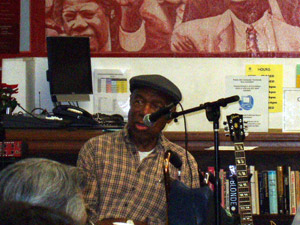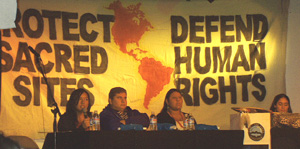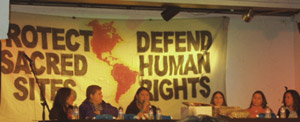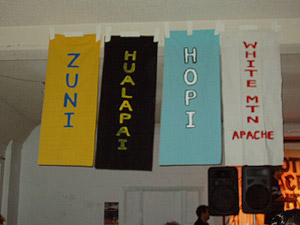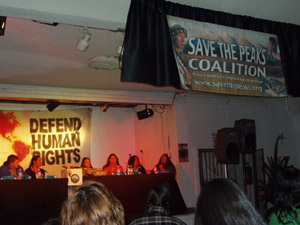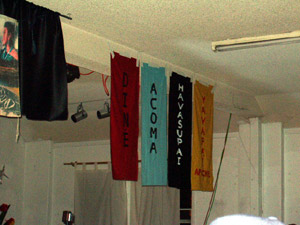paved road to hell: carrying the fire of apocalypse through cormac mccarthy's no country
I think Cormac McCarthy’s writing is splendid, but I have a problem with Cormac McCarthy’s writing.
I recently watched the film No Country For Old Men, the new Coen brothers’ adaptation of McCarthy’s 2005 novel by the same name. Like McCarthy’s follow-up novel, The Road (2006 Pulitzer Prize winner), the story here is propelled along intertwining strands of nihilism, apocalypse, and resilience—keeping hope alive at the end of the world as the rule of law collapses, as humanity collapses into its worst impulses. In The Road, a father and young son wander a stark, desolate, post-apocalyptic landscape, where next to food and drinkable water, the most prized commodities are shoes with which to keep walking. You keep moving in search of food and water, and you keep moving with the goal of avoiding contact with others at all costs, because in this world, the fuzzy lines between good and bad have been clearly demarcated once and for all: There are those who have crossed over to an animal state in which they enslave, torture, and eat other humans; and then there are the “good” guys who “carry the fire.” McCarthy’s father and son are the latter, as defined in particular by their refusal of cannibalism. Throughout the novel, the son asks for reassurance from the father that they will not resort to eating other people, no matter how hungry they get, and the father assures him that they will not, because they are the good guys. They carry the fire. They are civilization; they maintain hope. They will not descend into the darkness that has engulfed the world. They will not give up (unlike the boy’s mother, who betrayed (her) Family by killing herself alone after failing to convince the father to join her in a mutual family suicide when their son was born amidst the unfolding apocalypse).
Where The Road opens after the collapse, in No Country, the world is just beginning its rapid descent into lawlessness and nihilism in another father/son story in which a lost son seeks reassurance from his father. Here, the year is 1980, and both father and son are/were small-town Texas lawmen. Here, the ambiguous reassurance comes to the son in a dream of the father (the father has long since passed away), but the message is the same: Somewhere out in the mythical darkness, the father is waiting for the son on his horse, carrying the fire in a horn.
In both cases, the father and son are white Americans. (The Road never explicitly states this, but it is clear from their language, their interactions, their mythologies.) In both cases, women do not figure in the patriarchal equation—other than, of course, as betrayers, or as secondary, supporting characters (as Tommy Lee Jones’ retired sheriff Ed Tom Bell narrates the dream he had of his father, his wife, Loretta, played by Tess Harper, functions as little more than a patient sounding board across the kitchen table).
Most importantly, though, in both cases, the encroaching darkness is tied not to nonhuman sources, nor even so much to abstractions like human ideologies (e.g., the results of, say, capitalism, or imperialism, or fascism, or even just plain old greed). Instead, for McCarthy, the darkness is the result of humans who have crossed over into the nihilism of feeding on other humans (figuratively and literally), of cold-blooded murder, and of a total disregard for any form of law and order, purely and simply because they are evil. They are not “keepers of the fire;” they embrace and welcome and sow the darkness of chaos and disorder. They are, put simply, those shadowy “evildoers” of George Bush’s with-us-or-with-the-terrorists rendering of the world, those murky forms that for some reason hold pure, inexplicable hatred for good ole Americans like Sheriff Bell and their law-abiding “freedom.”
So who are these monsters, then, that threaten civilization and freedom and the fire of hope?
In The Road, the monsters are for the most part shadowy, armed, violent figures that appear only briefly, though quite horrifically, in rags and ratty hair and gas masks (did someone say black bloc?).
In papa and junior George Bushes’ world, the monsters are hiding in caves in Afghanistan. No wait, in bunkers in Iraq. No, I mean Iran. No wait, they’re just over the border in Mexico…
Which brings us to the Texas borderlands of No Country, where we get a clearer picture of who these monsters are in the form of the (ambiguously non-white, non-American) psychopathic killer Anton Chigurh (Spanish actor Javier Bardem), and the heavily armed, Mexican narcotraficantes to whom he is tied. Of course, the narcotraficantes are also tied to the wealthy, white Texan businessmen with whom they deal. But it is clear that the real threat knocking on Sheriff Bell’s door, pushing him to retirement, confounding and perplexing him and sending him in search of comfort from the ghost of daddy and the good ole days when sheriffs sometimes didn’t even need to wear a gun (once those bothersome Indians had all been done away with, of course)—comes from those old, dependable, standby dark forces of lawlessness just south of the Rio “Grand” who spit on civilization’s neat, clean borders and binary divides of good guys and bad guys. For these “barbarian” hordes, borders and laws mean nothing. For these “barbarians,” it is a smooth glide down a slippery slope from illegal border hopping to drug trafficking to psychopathic killing to cannibalism.
Not to worry, though—papa and junior Minuteman are there, carrying the fire. They stand courageous against the darkness, holding down the fort.
*
But all of this is not (entirely) my problem with Cormac McCarthy’s writing.
This is just a surface reading of some surface problems that I have with his writing and storylines. I could go deeper into McCarthy’s reification of racist logic, for example. I could go deeper into his retreat into, and defense of, patriarchy.
But I think my real problem goes back to my reading of McCarthy’s 1985 masterpiece, Blood Meridian, Or The Evening Redness in The West, about eight years ago.
Blood Meridian is a Faulknerian pomo deconstructive Western slasher epic that exposes Manifest Destiny and the “taming” of the “Wild West” as the gothic, bloody horror story that it was—one in which bands of roving whites slaughter Native Americans across the Southwest on an extermination bounty hunt for scalps. As in The Road and No Country (and another McCarthy gothic-horror-monster story, Child of God), Blood Meridian lays bare the human soul at its worst, as a gruesome, ruthless, evil monster (here, made manifest most clearly in another psychopathic killer, Judge Holden).
More to the point, though, as in his other novels, the language that McCarthy uses to describe this murder and mayhem in Blood Meridian is mesmerizing and dazzling, a highly stylized, beautifully tangled prose of idiosyncratic grammar and peculiar, archaic vocabulary. Reading this prose, I found myself enthralled by its beauty. And as with every other Cormac McCarthy novel I’ve read, I took extensive vocabulary notes, closely analyzed the grammatical structuring, and carefully studied the precision of McCarthy’s adjectives and how they looped thickly and elegantly around, and through, his metaphors. I fell into these pages the same way I’d once fallen into the prose-poetry of William Faulkner, and Don DeLillo, when I was younger.
But it is exactly this beauty, and my falling into it, that gets to the heart of my problem with Cormac McCarthy’s writing.
When I first read Blood Meridian, I found in its nonstop gore and violence an effective description of the ruthless imperialism and attendant genocide involved in the formation of the United States and its program of Manifest Destiny. I closed the book feeling exhausted and overwhelmed. Setting aside the form for a moment, much of the content of the novel, on one level, appeared to convey an unforgiving demythologization of the Western genre and a stark, clear picture of the real history of U.S. white supremacy in action.
And it is—Blood Meridian does indeed function to deconstruct popular notions of the “good” (white) lawmen moving in to tame the wild, “bad” (nonwhite) West, and pave the way for (white, Euro) “civilization.” The novel shows very clearly and graphically—relentlessly, on page after page—the horrifying violence and chaos, and the sheer blood and gore, involved in genocide and imperialist expansion. According to this reading, I even saw the book as a kind of decolonial text. And again, on some levels, it does function in a decolonial mode, for the same reasons.
But it is also a highly stylized text, one in which page after page of murder and chaos is rendered in an aesthetic of rich, dense, Melvillian/Faulknerian prose. As noted above, the language is absolutely stunning in its beauty and precision, spellbinding, hypnotic.
And this is my problem.
In the Coen brothers’ stylized cinematic adaptation of No Country For Old Men, the initial, gory onscreen murders slowly dwindle to offscreen, implied and suggested murders as the movie progresses—a critique of our corporate/military/media masters’ growing sophistication at distancing the beneficiaries of cold-blooded war and murder (i.e., us) from the actual war and murder, at shielding those beneficiaries from any of the blood involved in the imposition and maintenance of dominance. Simliarly, McCarthy’s Blood Meridian, with its deconstructive historical revisionism, would also appear to foreground the apparatuses that function to mask and distance the beneficiaries of imperial “civilization” from its real foundations of murder and chaos, in order to dismantle those apparatuses.
But ultimately, in both cases, the level of stylization serves more to aestheticize empire, rather than unmask it. The aesthetics of these works serve empire, rather than confront, subvert, or attack it.
This is language as empire, writing as a part of the imperialist project, a masquerade of content over form.
And so my problem with Cormac McCarthy’s writing is also what I have always liked most about it: I have been so dazzled by his use of the English language, that I failed to see the often reductive binary thinking operating underneath, to the point that I took his imperialistic use of language for an attack on empire, rather than as a contribution to it, and rather than as a reification of Western, Judeo-Christian logic. Reading Blood Meridian, as well as Child of God, I saw McCarthy’s rendering of monsters as part of the anti-imperialist project because, one, I was so focused on the form and the nature of the prose; and two, the monsters here were white, which I found to be a more historically accurate picture of the conquest of the Americas and the ongoing militarism and dominance of U.S. imperialism.
It was not until I read The Road, and then later saw No Country—with their white American father/son carriers of the fire against the dark forces of evil—that I realized that underneath the linguistic dazzle, and the surface invocation of the evils of white supremacy, McCarthy is ultimately not so much identifying, unmasking, and deconstructing the imperialist, racist, sexist sources of the problem. Instead, he is engaging—like most North American writers—in helping Western, binary logic along its linear progression toward the inevitability of a (self-fulfilling, apocalyptic) Finishline endpoint.
Which wouldn’t be such a problem—from a cyclical understanding of time, after all, McCarthy’s encroaching darkness is simply the world changing, power shifting, geography shifting, another empire falling, people on the move, like always. Those of us who operate (or are learning to operate) outside of linear time, can clearly see this, and can avoid the traps of such logic as we work together already to regenerate and build community, and to create a new world among the ashes of the old, even while they keep trying to freeze time and maintain their moment of dominance as the world changes around them. Those of us outside of their linear time, their self-fulfilling prophecies, their nihilistic endpoint reasoning, can see who the real barbarians have been all along.
But for McCarthy, and for all of those resolutely, blindly trudging along their thin, one-dimensional line from Start to Finish, flattening everyone/thing else along the way, scrabbling among the cold ash heaps of the memory of their power, this is not just the world changing—it is The End of the World. There is no other way that they can imagine it—Armageddon, Apocalypse, Total Collapse into Evil.
Because they cannot—or will not—imagine a world that they do not dominate. They refuse to see themselves as anything but that singular, individual subjectivity of Great Civilization, standing courageously and defiantly against a barbaric sea of chaos and ignorant objects. They refuse to see how it is exactly this logic and epistemology that has created all the darkness, the blindness, the confusion, in the first place.
And so their willful lack of imagination leads them to once again imagine no world at the inadequately mapped edges of their psychogeography’s sputtering timeline. Howling darkness. Here Lie Monsters. Chaos, Pure Evil, End of History, Collapse—
And themselves, of course, not as the creators and disseminators of that nihilism that has finally begun to blow back on them, but as the carriers of the fire of past and future civilization. As The Road and No Country For Old Men chillingly make clear, these thousand points of Civilized-lite will be there hanging on, clinging to their illogic, keeping the fire until the very end, come hell or high water—even if it means taking the rest of us down with them.
And I have a big problem with that.
I recently watched the film No Country For Old Men, the new Coen brothers’ adaptation of McCarthy’s 2005 novel by the same name. Like McCarthy’s follow-up novel, The Road (2006 Pulitzer Prize winner), the story here is propelled along intertwining strands of nihilism, apocalypse, and resilience—keeping hope alive at the end of the world as the rule of law collapses, as humanity collapses into its worst impulses. In The Road, a father and young son wander a stark, desolate, post-apocalyptic landscape, where next to food and drinkable water, the most prized commodities are shoes with which to keep walking. You keep moving in search of food and water, and you keep moving with the goal of avoiding contact with others at all costs, because in this world, the fuzzy lines between good and bad have been clearly demarcated once and for all: There are those who have crossed over to an animal state in which they enslave, torture, and eat other humans; and then there are the “good” guys who “carry the fire.” McCarthy’s father and son are the latter, as defined in particular by their refusal of cannibalism. Throughout the novel, the son asks for reassurance from the father that they will not resort to eating other people, no matter how hungry they get, and the father assures him that they will not, because they are the good guys. They carry the fire. They are civilization; they maintain hope. They will not descend into the darkness that has engulfed the world. They will not give up (unlike the boy’s mother, who betrayed (her) Family by killing herself alone after failing to convince the father to join her in a mutual family suicide when their son was born amidst the unfolding apocalypse).
Where The Road opens after the collapse, in No Country, the world is just beginning its rapid descent into lawlessness and nihilism in another father/son story in which a lost son seeks reassurance from his father. Here, the year is 1980, and both father and son are/were small-town Texas lawmen. Here, the ambiguous reassurance comes to the son in a dream of the father (the father has long since passed away), but the message is the same: Somewhere out in the mythical darkness, the father is waiting for the son on his horse, carrying the fire in a horn.
In both cases, the father and son are white Americans. (The Road never explicitly states this, but it is clear from their language, their interactions, their mythologies.) In both cases, women do not figure in the patriarchal equation—other than, of course, as betrayers, or as secondary, supporting characters (as Tommy Lee Jones’ retired sheriff Ed Tom Bell narrates the dream he had of his father, his wife, Loretta, played by Tess Harper, functions as little more than a patient sounding board across the kitchen table).
Most importantly, though, in both cases, the encroaching darkness is tied not to nonhuman sources, nor even so much to abstractions like human ideologies (e.g., the results of, say, capitalism, or imperialism, or fascism, or even just plain old greed). Instead, for McCarthy, the darkness is the result of humans who have crossed over into the nihilism of feeding on other humans (figuratively and literally), of cold-blooded murder, and of a total disregard for any form of law and order, purely and simply because they are evil. They are not “keepers of the fire;” they embrace and welcome and sow the darkness of chaos and disorder. They are, put simply, those shadowy “evildoers” of George Bush’s with-us-or-with-the-terrorists rendering of the world, those murky forms that for some reason hold pure, inexplicable hatred for good ole Americans like Sheriff Bell and their law-abiding “freedom.”
So who are these monsters, then, that threaten civilization and freedom and the fire of hope?
In The Road, the monsters are for the most part shadowy, armed, violent figures that appear only briefly, though quite horrifically, in rags and ratty hair and gas masks (did someone say black bloc?).
In papa and junior George Bushes’ world, the monsters are hiding in caves in Afghanistan. No wait, in bunkers in Iraq. No, I mean Iran. No wait, they’re just over the border in Mexico…
Which brings us to the Texas borderlands of No Country, where we get a clearer picture of who these monsters are in the form of the (ambiguously non-white, non-American) psychopathic killer Anton Chigurh (Spanish actor Javier Bardem), and the heavily armed, Mexican narcotraficantes to whom he is tied. Of course, the narcotraficantes are also tied to the wealthy, white Texan businessmen with whom they deal. But it is clear that the real threat knocking on Sheriff Bell’s door, pushing him to retirement, confounding and perplexing him and sending him in search of comfort from the ghost of daddy and the good ole days when sheriffs sometimes didn’t even need to wear a gun (once those bothersome Indians had all been done away with, of course)—comes from those old, dependable, standby dark forces of lawlessness just south of the Rio “Grand” who spit on civilization’s neat, clean borders and binary divides of good guys and bad guys. For these “barbarian” hordes, borders and laws mean nothing. For these “barbarians,” it is a smooth glide down a slippery slope from illegal border hopping to drug trafficking to psychopathic killing to cannibalism.
Not to worry, though—papa and junior Minuteman are there, carrying the fire. They stand courageous against the darkness, holding down the fort.
*
But all of this is not (entirely) my problem with Cormac McCarthy’s writing.
This is just a surface reading of some surface problems that I have with his writing and storylines. I could go deeper into McCarthy’s reification of racist logic, for example. I could go deeper into his retreat into, and defense of, patriarchy.
But I think my real problem goes back to my reading of McCarthy’s 1985 masterpiece, Blood Meridian, Or The Evening Redness in The West, about eight years ago.
Blood Meridian is a Faulknerian pomo deconstructive Western slasher epic that exposes Manifest Destiny and the “taming” of the “Wild West” as the gothic, bloody horror story that it was—one in which bands of roving whites slaughter Native Americans across the Southwest on an extermination bounty hunt for scalps. As in The Road and No Country (and another McCarthy gothic-horror-monster story, Child of God), Blood Meridian lays bare the human soul at its worst, as a gruesome, ruthless, evil monster (here, made manifest most clearly in another psychopathic killer, Judge Holden).
More to the point, though, as in his other novels, the language that McCarthy uses to describe this murder and mayhem in Blood Meridian is mesmerizing and dazzling, a highly stylized, beautifully tangled prose of idiosyncratic grammar and peculiar, archaic vocabulary. Reading this prose, I found myself enthralled by its beauty. And as with every other Cormac McCarthy novel I’ve read, I took extensive vocabulary notes, closely analyzed the grammatical structuring, and carefully studied the precision of McCarthy’s adjectives and how they looped thickly and elegantly around, and through, his metaphors. I fell into these pages the same way I’d once fallen into the prose-poetry of William Faulkner, and Don DeLillo, when I was younger.
But it is exactly this beauty, and my falling into it, that gets to the heart of my problem with Cormac McCarthy’s writing.
When I first read Blood Meridian, I found in its nonstop gore and violence an effective description of the ruthless imperialism and attendant genocide involved in the formation of the United States and its program of Manifest Destiny. I closed the book feeling exhausted and overwhelmed. Setting aside the form for a moment, much of the content of the novel, on one level, appeared to convey an unforgiving demythologization of the Western genre and a stark, clear picture of the real history of U.S. white supremacy in action.
And it is—Blood Meridian does indeed function to deconstruct popular notions of the “good” (white) lawmen moving in to tame the wild, “bad” (nonwhite) West, and pave the way for (white, Euro) “civilization.” The novel shows very clearly and graphically—relentlessly, on page after page—the horrifying violence and chaos, and the sheer blood and gore, involved in genocide and imperialist expansion. According to this reading, I even saw the book as a kind of decolonial text. And again, on some levels, it does function in a decolonial mode, for the same reasons.
But it is also a highly stylized text, one in which page after page of murder and chaos is rendered in an aesthetic of rich, dense, Melvillian/Faulknerian prose. As noted above, the language is absolutely stunning in its beauty and precision, spellbinding, hypnotic.
And this is my problem.
In the Coen brothers’ stylized cinematic adaptation of No Country For Old Men, the initial, gory onscreen murders slowly dwindle to offscreen, implied and suggested murders as the movie progresses—a critique of our corporate/military/media masters’ growing sophistication at distancing the beneficiaries of cold-blooded war and murder (i.e., us) from the actual war and murder, at shielding those beneficiaries from any of the blood involved in the imposition and maintenance of dominance. Simliarly, McCarthy’s Blood Meridian, with its deconstructive historical revisionism, would also appear to foreground the apparatuses that function to mask and distance the beneficiaries of imperial “civilization” from its real foundations of murder and chaos, in order to dismantle those apparatuses.
But ultimately, in both cases, the level of stylization serves more to aestheticize empire, rather than unmask it. The aesthetics of these works serve empire, rather than confront, subvert, or attack it.
This is language as empire, writing as a part of the imperialist project, a masquerade of content over form.
And so my problem with Cormac McCarthy’s writing is also what I have always liked most about it: I have been so dazzled by his use of the English language, that I failed to see the often reductive binary thinking operating underneath, to the point that I took his imperialistic use of language for an attack on empire, rather than as a contribution to it, and rather than as a reification of Western, Judeo-Christian logic. Reading Blood Meridian, as well as Child of God, I saw McCarthy’s rendering of monsters as part of the anti-imperialist project because, one, I was so focused on the form and the nature of the prose; and two, the monsters here were white, which I found to be a more historically accurate picture of the conquest of the Americas and the ongoing militarism and dominance of U.S. imperialism.
It was not until I read The Road, and then later saw No Country—with their white American father/son carriers of the fire against the dark forces of evil—that I realized that underneath the linguistic dazzle, and the surface invocation of the evils of white supremacy, McCarthy is ultimately not so much identifying, unmasking, and deconstructing the imperialist, racist, sexist sources of the problem. Instead, he is engaging—like most North American writers—in helping Western, binary logic along its linear progression toward the inevitability of a (self-fulfilling, apocalyptic) Finishline endpoint.
Which wouldn’t be such a problem—from a cyclical understanding of time, after all, McCarthy’s encroaching darkness is simply the world changing, power shifting, geography shifting, another empire falling, people on the move, like always. Those of us who operate (or are learning to operate) outside of linear time, can clearly see this, and can avoid the traps of such logic as we work together already to regenerate and build community, and to create a new world among the ashes of the old, even while they keep trying to freeze time and maintain their moment of dominance as the world changes around them. Those of us outside of their linear time, their self-fulfilling prophecies, their nihilistic endpoint reasoning, can see who the real barbarians have been all along.
But for McCarthy, and for all of those resolutely, blindly trudging along their thin, one-dimensional line from Start to Finish, flattening everyone/thing else along the way, scrabbling among the cold ash heaps of the memory of their power, this is not just the world changing—it is The End of the World. There is no other way that they can imagine it—Armageddon, Apocalypse, Total Collapse into Evil.
Because they cannot—or will not—imagine a world that they do not dominate. They refuse to see themselves as anything but that singular, individual subjectivity of Great Civilization, standing courageously and defiantly against a barbaric sea of chaos and ignorant objects. They refuse to see how it is exactly this logic and epistemology that has created all the darkness, the blindness, the confusion, in the first place.
And so their willful lack of imagination leads them to once again imagine no world at the inadequately mapped edges of their psychogeography’s sputtering timeline. Howling darkness. Here Lie Monsters. Chaos, Pure Evil, End of History, Collapse—
And themselves, of course, not as the creators and disseminators of that nihilism that has finally begun to blow back on them, but as the carriers of the fire of past and future civilization. As The Road and No Country For Old Men chillingly make clear, these thousand points of Civilized-lite will be there hanging on, clinging to their illogic, keeping the fire until the very end, come hell or high water—even if it means taking the rest of us down with them.
And I have a big problem with that.
